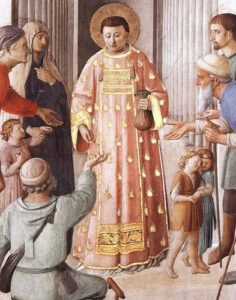Tuesday of the Eighth Week in Ordinary Time – Mk 10:28-31
Today’s Gospel continues to examine the costs and rewards of following Jesus. Yesterday’s Gospel presented the rich young man, who goes away sad after Jesus tells him to give up his material possessions, but today’s Gospel has Peter asking about the rewards that those who follow Christ will receive. There are three details that we can point out as we consider the way we live out our consecration, be it baptismal or religious.
First, this is the only example in the Gospels where Jesus interrupts someone. Mark tells us that “Peter began to say,” but Jesus doesn’t let him get beyond that one sentence. Probably Peter wanted to ask what the reward was for those who, like him, had given up everything, but Jesus doesn’t let him ask it. That question, “What do those who give up everything to follow Jesus get in return?” is perhaps an unanswerable question because how do you describe that reward? There’s heaven, of course, of which Saint Paul says “Eye has not seen, and ear has not heard, nor has it entered the human heart, what God has prepared for those who love him” (1 Cor 2:9); in other words, it’s beyond description. Then there’s the joy that comes from doing God’s will, the grace that flows from that decision, the everyday miracles that we grow so used to seeing. If “the good of the grace of one soul is greater than the good of the nature of the whole universe,” as Aquinas says (I-II, q. 113, a. 9), how can we even begin to measure the good of a religious soul that constantly lives in God’s presence? Peter’s question would have been unanswerable, because all words and all descriptions fall short.
Secondly, notice the list of things that Jesus mentions giving up. This Gospel follows right after the rich young man has gone away sad because he had many material possessions, and it’s quite probable that Peter has his material goods in mind: his fishing boat, his house, and so on. The word Peter uses just means, “everything.” Yet, Jesus replies a specific list of things, the majority of which aren’t simply material goods, but, we could say, more spiritual. The list starts with material goods, then more spiritual ones, and ends, oddly, with the Greek ἀγροὺς, meaning “fields” or “lands,” which would seem to be simply material. Yet, it’s important to remember that fields in the Bible aren’t simply physical places: they are part of a family’s inheritance and future, and fields are not only the place where things are planted and grown, but also where cattle can be raised, battles fought, and the dead buried.[1] In other words, fields are full of potential, full of future possibilities and dreams. In our vocations we surrender all that to Jesus, and it’s as though Jesus responds by saying, “I know exactly what you have given up for my sake, even more than you know”; indeed, He’s the only one who really knows. The God who tells us through Isaiah, “See, upon the palms of my hands I have written your name” (Is 49:16), and in the Psalm that “our tears are stored in His flask, recorded in His book?” (cf. Ps 56:9), will not let anything we give up be forgotten. He takes all of that, and opens to us a hundred more possibilities as He takes our futures into His hands: as He said through the prophet Jeremiah: “For I know well the plans I have in mind for you—plans for your welfare and not for woe, so as to give you a future of hope” (29:11).
Lastly, all of these things are given together with persecutions, and it seems that Jesus intends for us to understand this as a good thing. Indeed, the other things can be given up in a moment, set aside once out of love for Jesus and never picked up again. Persecutions and sufferings keep our love fresh. As Saint Gemma Galgani wrote, “If you really want to love Jesus, first learn to suffer, because suffering teaches you to love.” That constant pruning away of everything that is not Jesus is what keeps us constantly close to His Sacred Heart, and disposes us for final perseverance, the greatest gift of all.
Today, let us give thanks to God for our vocations, and really examine ourselves to see how well we are living them. Let us ask, through the intercession of Mary, Help of Christians, for the grace to continue to give up everything for Jesus, and to rest assured that He knows, better than we do, what we have given to Him.
[1] Cf. Geoffrey W. Bromiley, International Standard Bible Encyclopedia: E-J, 301.







